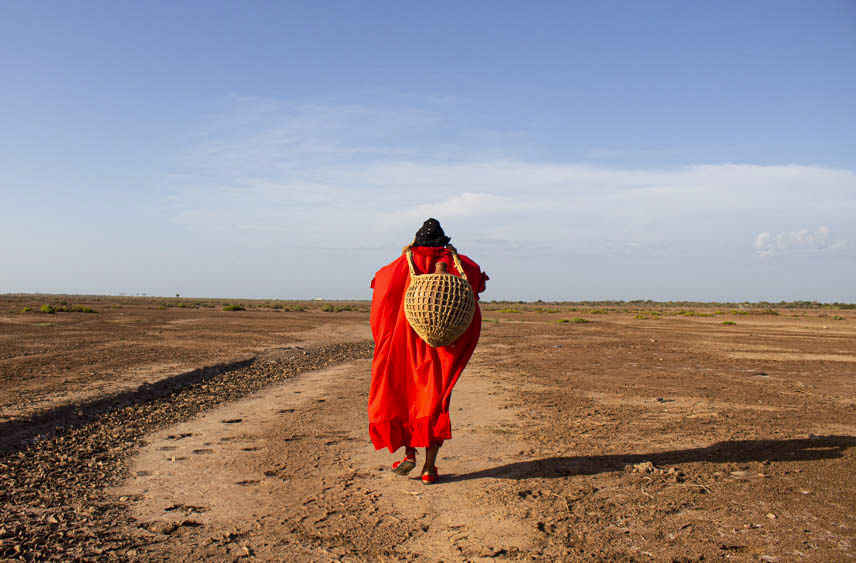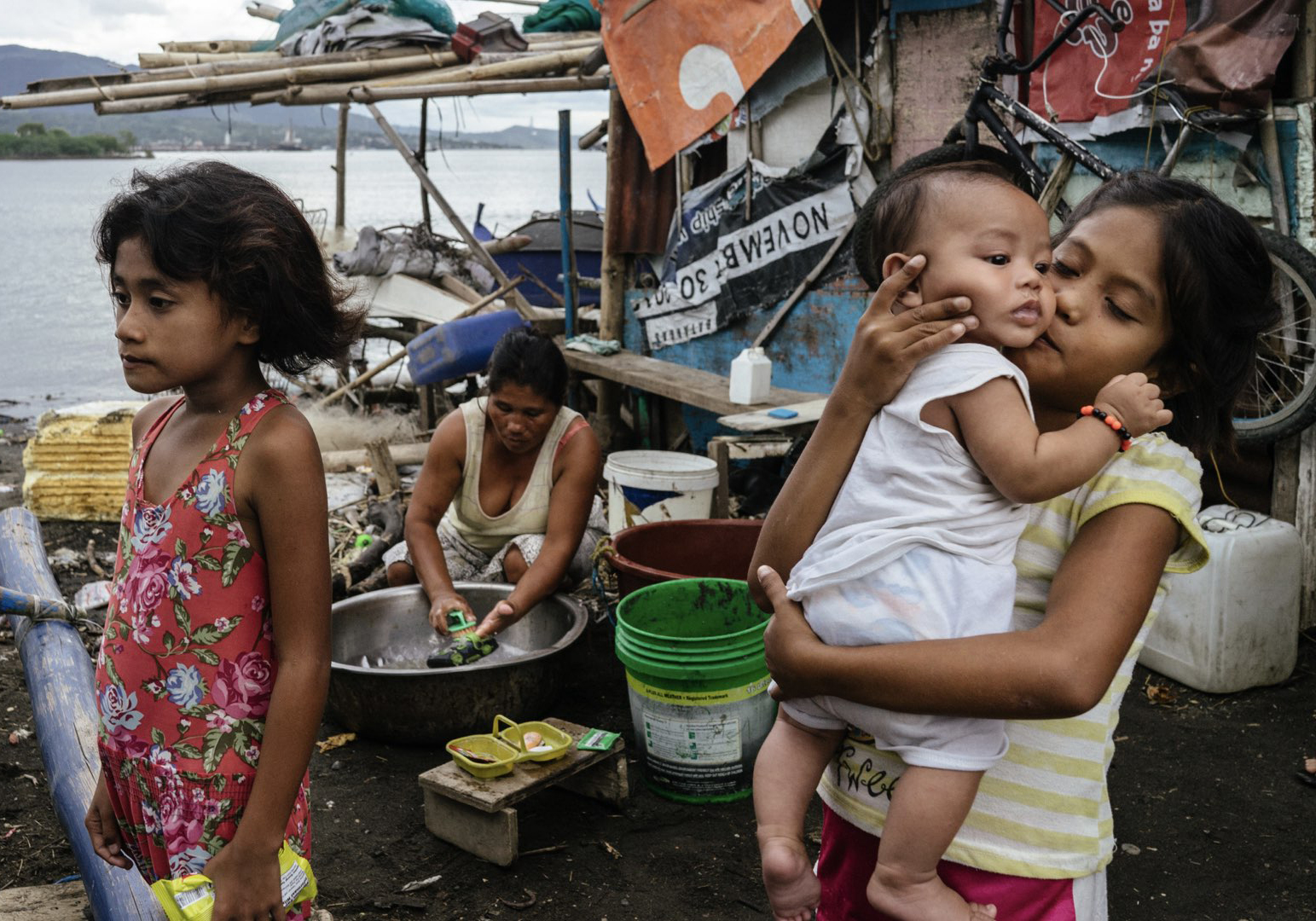
With COP26 currently underway, we ask: is it possible that climate change is impacting women more than men?
You know by now that global warming is having a devastating and, in some parts irreversible, impact on our planet. As per the latest UN IPCC report, glaciers are melting, CO2 levels are rising, and the amount of methane in the atmosphere is the highest it's been in 800,000 years.
According to Angela Baschieri, population dynamics policy adviser for UNFPA, the United Nations' sexual and reproductive health agency, climate change isn't impacting genders equally.
Quite the opposite. They believe that global warming has long been unequal when it comes to affecting genders. "Estimates suggest that approximately 507 women and girls die every day as a result of complications from pregnancy and childbirth in regions affected by conflict, displacement and natural disasters," shares Baschieri - and research suggests that an increase of one degree Celsius in the week before delivery corresponds with a six percent greater likelihood of stillbirths.
The Tanna Women’s Counselling Centre reported a 300% increase in domestic violence cases after two tropical cyclones hit Tafe Province in Vanuatu in 2011.
In Nepal and Bangladesh, research indicates that girls have been forced to drop out of school and marry to alleviate financial hardships caused by extreme weather.
As a United Nations agency, UNFPA’s focus is to ensure that all women and girls can realise their sexual reproductive health and rights. This support is needed more than ever given the frequency of natural disasters due to climate change. "There's no doubt that all of humanity is subject to the effects of climate change - but marginalised groups like women and girls are vulnerable to particular adversities," shares Baschieri.
Here, Bascheri further breaks down how climate change is impacting women more than men, plus shares five easy-to-action ways you could help prevent it from happening. Don't miss our guides to sustainable living, B Corp brands and the meaning of net zero, while you're here.
Celebrity news, beauty, fashion advice, and fascinating features, delivered straight to your inbox!
Climate change impact: why does climate change affect women and girls more than men?
You might think that natural disasters like hurricanes, wildfires and landslides can't possibly affect one gender more than another - right?
Wrong. "The reality is that when intense rains fall more frequently causing floods, or spells of drought last several years causing food insecurity, or landslides, hurricanes or cyclones hit threatening lives, livelihoods and natural resources, those with the fewest resources are most susceptible to the negative effects – particularly women, the majority of the world’s poor," explains Bascheri.
Similarly, in many parts of the world, women still face unequal access to formal financial systems, land ownership, reproductive health care, education and information, undermining their wellbeing in addition to that of their families and communities. "It is these social, economic and political barriers that can limit their decision-making power and ability to adapt, making them disproportionately vulnerable to environmental change," Bascheri continues.
It all links back to systemic gender inequality - women still don't have equal rights, and so don't have an equal footing when it comes to avoiding the devastation climate change can cause.
"Climate change impact can worsen and accelerate pre-existing gender inequalities, exacerbating dispossession, marginalisation of and discrimination against women and girls in affected communities," Bascheri explains.
This impact, in turn, affects women and girls’ ability to have control over their bodies and to adapt or recover from climate-induced emergencies.
4 examples of climate change impact on women and girls
According to Bascheri, climate change can:
1. Lead to more gender based violence
Did you know? Women in humanitarian settings are more vulnerable to climate change repercussions as they tend to rely more on natural resources for their livelihoods, and are tasked with securing water, food and fuel for cooking and heating for their families, exposing them to greater risk.
"Climate change is a multiplier of existing health vulnerabilities: it limits access to safe water, sanitation and shelter, worsens food insecurity, and impacts access to health care and education," explains Dr. Natalia Kanem, executive director of UNFPA.
"Marginalised groups are especially vulnerable, and sadly women and girls make up the majority of the global poor and those vulnerable communities who largely depend on natural resources for their livelihoods."
They often have to walk great distances unprotected, meaning they are vulnerable to sexual and physical gender-based violence. "UNFPA found sex trafficking spiked after cyclones and
typhoons in the Asia-Pacific region and intimate partner violence rose during drought in East Africa and tropical storms in Latin America," Baschieri shares.
Rates of domestic violence, sexual abuse and FGM also grew during extended periods of drought in Uganda, highlighting that this occurrence wasn't a one off.

2. Contribute to a rise in child marriages
As above, extreme weather exacerbates poverty - which has been found to cause families to marry off young daughters so there’s one less mouth to feed, shares the expert.
"Climate-affected populations see an increase in financial stress on families when livelihoods are lost or reduced," Bascheri explains. Studies have long indicated a rise in early marriage in countries affected by climate change including in Bangladesh, Malawi, Nepal, and the Philippines, among others.
Families are desperate and, sadly, it appears that women and girls are often the first affected when times get tough.
3. Lead to stillbirth and other neonatal issues
Similarly, and as mentioned in the introduction, research indicates that temperature increases has been associated with an increase in pregnancy risk that translates to about four additional stillbirths per 10,000 births.
"Similarly, rising temperatures are lengthening the seasons when mosquitoes are active, leading to an increased likelihood in catching malaria, which can lead to miscarriage, premature birth and anaemia," Baschieri explains.
Climate change isn't just affecting women's home lives, but their physical health and reproductive abilities, too.
4. Disrupt sexual and reproductive health and limit access to contraception
Finally - as we’ve seen with Covid-19 - emergencies are diverting healthcare resources towards fighting the latest threat and away from services deemed less essential.
And it's not just contraception, but healthcare too. "Climate-related emergencies cause major disruptions in access to health services, including maternal health care, and life-saving medicines, including contraception and maternal health medicines," explains Baschieri.
Bottom line? Tackling inequalities, in particular gender equality, is key to building a better, healthier planet. "It's essential that we solve both crises together, and empower women and girls, and other marginalised groups, to be more resilient and adaptive to the impacts of climate change," Baschieri explains.
Many of the people who already face barriers to the achievement of their sexual and reproductive health and rights are the same populations that are disproportionately affected by climate change, including migrants, refugees, older persons and persons with disabilities.

What can you do to support women most impacted by climate change?
The answer's not a simple one, and the problem can't be solved by one person, but know this: every little helps, and your actions do make a difference.
1. Join the movement
Join the movement to ensure that everyone — especially women and girls — can access the quality sexual and reproductive health care they need and deserve.
One way of doing so is by following organisations like UN Women, the Women's Environmental Network or Gender CC and sharing their campaigns on your social media and via word of mouth.
2. Lobby governments
Lobby governments to prioritise gender equality and sexual and reproductive health and rights in foreign policy and overseas aid.
There are several ways to lobby a government - you could organise a peaceful protest, set up a campaign page online, or invite an MP to discuss the matter at an event. It could even be as simple as writing to your local MP - as per the parliament website, all you need to do is write a personal letter explaining your reason for concern and asking for your MP's support.
3. Donate
Donating to organisations that are protecting women and girls’ rights during times of crisis, conflict and disaster, including access to sexual and reproductive health services, makes a huge difference to the cause.
Our favourites include Action Aid and the Wonder Foundation.
4. Listen
Ensure young people’s voices are heard – they must be at the centre of efforts to tackle climate change.
5. Remember: personal action counts
Remember: while individuals alone may not be able to make the drastic emissions cuts that limit climate change, personal action can raise – and keep – women and girls’ rights and choices at the top of the climate change agenda.

Ally is Marie Claire UK's Senior Health and Sustainability Editor, a well-regarded wellness expert, ten-time marathoner, and Boston Qualifying runner.
Utilising her impressive skillset and exceptional quality of writing, she pens investigative, review and first-person pieces that consistently demonstrate flair and originality.
As well as writing, Ally manages a team of freelancers, oversees all commissioning and strategy for her pillars, and spearheads the brand's annual Women in Sport covers, interviewing and shooting the likes of Mary Earps, Millie Bright, and Ilona Maher. Shortlisted for three BSMEs and winning one in 2022, Ally lives and breathes her verticals: her eye for a story and connections within the wellness sphere are unrivalled. Follow Ally on Instagram for more.
